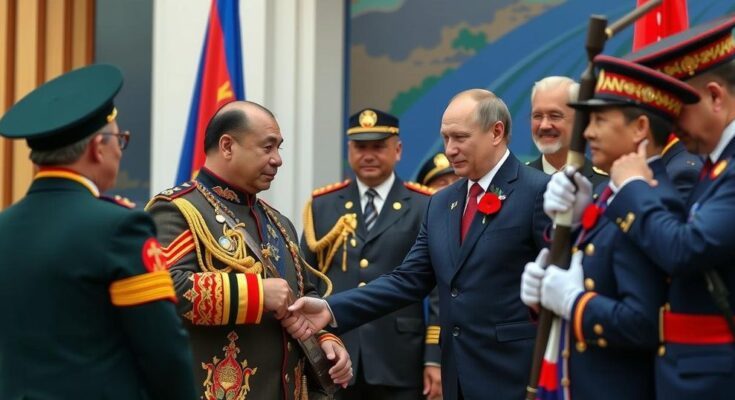Mongolia hosted Russian President Vladimir Putin despite war crimes accusations against him for the illegal deportation of Ukrainian children. During his visit, Putin met with Mongolian President Khurelsukh, who expressed strong bilateral ties. Ukrainian officials criticized Mongolia for not arresting him, while the EU lamented insufficient adherence to the ICC’s obligations. Domestic public opinion cautiously favors maintaining relations with Russia and China.
Mongolia extended a warm welcome to Russian President Vladimir Putin during his recent visit to Ulaanbaatar, despite ongoing allegations of war crimes against him. Arriving at Genghis Khan Square, Putin engaged in discussions with President Ukhnaagiin Khurelsukh, emphasizing the countries’ shared perspectives on various international matters. This visit occurs amid calls from Kyiv and Western nations for Putin’s arrest by the International Criminal Court (ICC) due to the illegal deportation of Ukrainian children amid the ongoing conflict in Ukraine.
Ukrainian Prosecutor General Andriy Kostin criticized Mongolia’s decision to not arrest Putin, claiming it undermines the nation’s international reputation. Meanwhile, the European Union expressed disappointment over Mongolia’s non-compliance with its obligations under the Rome Statute, which established the ICC. The United States acknowledged Mongolia’s challenging geopolitical position between Russia and China and expressed hope that Mongolian officials would voice concerns regarding Putin’s actions during his visit.
Mongolia maintains crucial economic and cultural ties with both Russia and China and has strategically balanced relations since its independence from Soviet influence in 1991. Public sentiment in Ulaanbaatar reflected caution, with locals acknowledging the importance of maintaining stable relations with both neighboring powers. Observers stated that the likelihood of Putin being arrested during this visit was negligible, as Mongolia prioritizes its bilateral relations with Russia above international pressure.
The atmosphere at Genghis Khan Square was festive, although a small group of protestors demanding accountability for Putin’s actions was met with a heavy security presence. Despite the government’s efforts to suppress dissent, public discussions continue regarding the implications of hosting a leader accused of war crimes located at the heart of ongoing global tensions. This visit commemorates the 85th anniversary of a critical victory by Mongolian and Soviet forces over Imperial Japan.
Putin’s visit to Mongolia occurs at a significant geopolitical juncture, where international relations are strained due to Russia’s ongoing military actions in Ukraine, resulting in severe condemnation from global leaders and organizations. Mongolia finds itself in a complex situation, striving to navigate its historical ties with Russia while also managing its relationships with other major powers, particularly China and the West. Following the collapse of the Soviet Union, Mongolia has pursued a foreign policy marked by balance and pragmatism, seeking to maintain amicable relations with both Moscow and Beijing. This visit is not only a diplomatic engagement but also a reflection of Mongolia’s broader strategic considerations in the face of escalating international criticisms of Russia. The ICC, established to ensure accountability for war crimes, has issued a warrant against Putin, which complicates the international expectations for Mongolia. As a member state adhering to the Rome Statute, Mongolia faces scrutiny for its decision to not comply with ICC obligations when hosting a leader sought by the court.
In conclusion, while Mongolia displays diplomatic hospitality towards President Putin during his visit, the decision to not arrest him restates the delicate balance the nation must maintain amid global tensions and international law obligations. Local public opinion appears to support the government’s cautious approach, valuing national stability and relationships with neighboring powers. As Mongolia reflects on its historical ties with Russia and the wider implications of hosting a controversial figure on the international stage, ongoing debates over accountability and compliance with international norms continue to shape this situation.
Original Source: www.channelnewsasia.com




